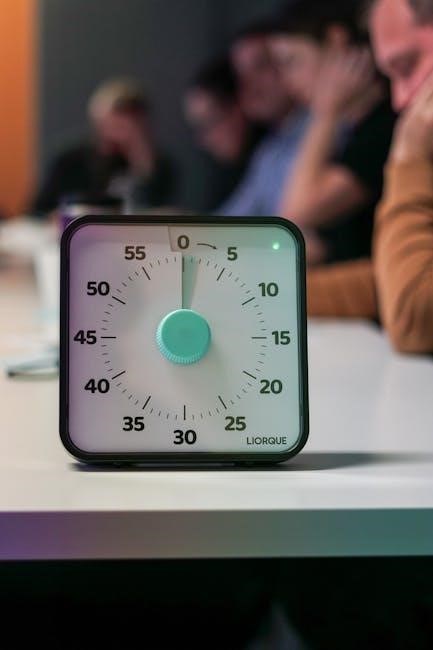Tracking LCSW hours is essential for licensure, ensuring accurate documentation of clinical and supervision experiences․ A structured form guides professionals in recording client interactions and supervision sessions efficiently, promoting compliance with regulatory requirements while streamlining the licensure process․

What is an LCSW Hours Tracking Form?
An LCSW hours tracking form is a tool for documenting clinical hours, supervision sessions, and client interactions, ensuring compliance with licensure requirements and professional standards․
Definition and Purpose
An LCSW hours tracking form is a structured document designed to record clinical hours, supervision sessions, and client interactions․ Its primary purpose is to ensure accurate documentation of professional experiences, essential for licensure and compliance with regulatory standards․ The form typically includes sections for personal and supervisory details, client contact hours, and service types, providing a comprehensive overview of a licensee’s professional activities․ By maintaining detailed records, professionals can demonstrate adherence to licensing requirements and maintain transparency in their practice, ensuring accountability and ethical standards in social work․ This tool is indispensable for LCSWs navigating the licensure process and ongoing professional development․
Importance of Accurate Tracking
Accurate tracking of LCSW hours is crucial for meeting licensure requirements and maintaining professional integrity․ Precise documentation ensures that all clinical and supervision hours are verified, preventing overreporting or underreporting․ It also facilitates seamless audits and compliance with regulatory standards․ Incomplete or inaccurate records can lead to delays or complications in the licensing process․ Furthermore, accurate tracking promotes accountability and ethical practice, as it provides a clear audit trail of professional activities․ By maintaining detailed and precise records, LCSWs can ensure transparency and uphold the standards expected in the field of social work, ultimately supporting their credibility and career advancement․
How to Obtain the LCSW Hours Tracking Form
Download the LCSW hours tracking form from your state’s licensing board website or contact them directly for the official document․ Free templates are also available online․
Downloading from Licensing Boards
Visit your state’s licensing board website to download the official LCSW hours tracking form․ Most boards provide downloadable PDFs or direct links․ Ensure the form aligns with your state’s specific requirements․ Contact the licensing board via email or phone if the form is not easily accessible online․ Free LCSW hours tracking templates are also available online, but verify they meet your state’s standards before use․ Always confirm the form’s version and compatibility with your licensing jurisdiction to avoid discrepancies․ Accurate completion of the form is essential for licensure, so double-check all details before submission․
Ensuring the Correct Version
Always verify the version of the LCSW hours tracking form to ensure compliance with licensing requirements․ Check your state licensing board’s website for the most recent updates or version numbers․ Avoid using outdated forms, as they may not meet current regulations․ If unsure, contact the licensing board directly for confirmation․ Using the correct version prevents delays in licensure and ensures all recorded hours align with regulatory standards․ Double-check the form’s details before submission to avoid discrepancies․ Accurate documentation is critical, so ensure the form matches your state’s specific requirements․ Regularly update your form to reflect any changes in licensing regulations or tracking criteria․

Filling Out the LCSW Hours Tracking Form
Accurately log each session, ensuring all required client and supervision details meet licensing standards․ Maintain precise records to support your licensure application and professional development․
Step-by-Step Instructions
Start by obtaining the official LCSW hours tracking form from your licensing board․ Fill in personal details and the date range for the tracking period․ Log client contact hours, specifying individual or group sessions, and note the type of service provided․ Record supervision sessions, including dates, duration, and topics discussed․ Ensure accurate entry of total weekly hours, adhering to the maximum allowed limit․ Regularly review and update the form to avoid discrepancies․ Once complete, have your supervisor sign off and retain a copy for your records․ This systematic approach ensures compliance with licensing requirements and streamlines the documentation process․
Documenting Client Contact Hours
Accurately documenting client contact hours is crucial for LCSW licensure․ Log each session, noting the date, duration, and type of service provided, such as individual or group therapy․ Specify whether sessions were face-to-face or remote․ Categorize hours according to direct client contact, including psychotherapy, assessments, or case management․ Ensure entries are consistent and detailed, avoiding vague descriptions․ Regularly update the log to maintain accuracy and prevent oversights․ This thorough documentation not only meets licensing requirements but also provides a clear record of your clinical experience, essential for supervisor review and certification processes․ Precision in recording client hours demonstrates professionalism and accountability in your practice․
Recording Supervision Sessions
Recording supervision sessions is vital for LCSW licensure; Document the date, duration, and type of supervision, such as individual or group sessions․ Note whether meetings were face-to-face, remote, or a mix․ Include discussion topics, such as client cases, treatment plans, or professional development․ Ensure supervisor signatures are obtained for validation․ Track the total hours accrued, distinguishing between clinical and administrative discussions․ Maintain a separate log for supervision to avoid mixing it with client contact hours․ Accurate and timely recording ensures compliance with licensing requirements and provides a clear audit trail; Regular updates help prevent discrepancies and demonstrate adherence to professional standards, supporting your licensure application․
Required Information for the Tracking Form
The LCSW tracking form requires personal details, supervisory information, client interaction hours, and service types․ It ensures comprehensive documentation of clinical experiences and supervision sessions for licensure compliance․
Personal and Supervisory Details
The LCSW tracking form requires specific personal and supervisory information to ensure accountability and proper documentation․ Personal details include the licensee’s name, professional license number, and contact information․ Supervisory details involve the supervisor’s name, credentials, and contact information․ This section also includes the supervisor’s signature, confirming the validity of the logged hours․ Accurate completion of these fields is crucial for maintaining professional standards and ensuring that the hours recorded are legitimate and approved․ Proper documentation helps prevent discrepancies and ensures compliance with licensing board requirements․ This section serves as the foundation for the entire tracking process, ensuring transparency and credibility in the recorded data․
Client Interaction and Service Types
Documenting client interaction and service types is critical for accurate tracking․ The form requires detailing the nature of client contact, such as individual or group sessions, and the specific services provided, like psychotherapy, case management, or crisis intervention․ Each interaction must be categorized to ensure clarity and compliance with licensure requirements․ This section helps distinguish between direct client care and other professional activities, ensuring that only relevant hours are counted․ Proper categorization also aids in generating summary reports for licensure applications, making it easier to demonstrate the breadth and depth of clinical experience․ This detailed documentation supports both professional development and regulatory compliance․
Calculating and Summarizing Hours
Calculating and summarizing hours involves adding up clinical and supervision hours, ensuring accuracy for licensure requirements․ A clear summary helps track progress and meet regulatory standards effectively․
Total Hours per Week
Tracking total hours per week is crucial for ensuring compliance with licensing requirements․ Most LCSW hours tracking forms cap the maximum allowable hours at 40 per week․ This limit helps prevent overreporting and ensures a balanced workload․ The form typically categorizes hours into sections, such as client contact hours and supervision sessions․ Accurate weekly tallies are essential for maintaining progress toward licensure․ Supervisors often review these totals to verify adherence to regulations․ Keeping a running total each week simplifies end-of-period summaries and reduces errors․ This structured approach ensures transparency and accountability in the licensure process;
Maximum Hours Allowed
The LCSW hours tracking form typically caps the maximum hours allowed at 40 per week to prevent overreporting and ensure compliance․ This limit applies to both client contact and supervision hours․ Exceeding this cap may lead to rejection of hours by licensing boards․ The form often includes sections for categorizing hours, such as individual or group sessions, and requires detailed documentation․ Ensuring adherence to this limit is crucial for maintaining accurate records and avoiding delays in licensure․ Supervisors and licensing boards review these totals to verify compliance with regulatory standards, making it essential to stay within the specified maximum․
Understanding Supervision Hours
Supervision hours are crucial for LCSW licensure, requiring direct oversight by approved supervisors․ The form helps track these hours, ensuring they meet licensing standards and regulatory requirements effectively․
Direct Supervision Requirements
Direct supervision requires face-to-face interaction between the LCSW candidate and their approved supervisor․ This ensures hands-on guidance and feedback, meeting licensing standards․ The LCSW hours tracking form includes sections to document these interactions, ensuring accurate records of supervised hours․ Supervisors must meet specific qualifications, such as being licensed professionals, to validate the supervision․ Regular meetings and detailed notes are essential to demonstrate compliance․ The form helps track the frequency and duration of these sessions, ensuring transparency and accountability․ Proper documentation of direct supervision hours is critical for licensure approval, as it verifies the candidate’s readiness for independent practice․
Group Supervision Considerations
Group supervision offers a collaborative learning environment, allowing LCSW candidates to share experiences and gain insights from peers․ The LCSW hours tracking form must distinguish between individual and group supervision hours, as licensing boards often have specific requirements for each․ Group sessions typically involve case discussions, skill development, and feedback, but may count differently toward total supervision hours․ The form should include details such as the date, duration, and focus of each session․ It’s important to ensure that group supervision aligns with licensing board regulations and contributes effectively to the candidate’s professional growth․ Proper documentation is key to meeting licensure requirements and demonstrating accountability․
Maintaining Accurate Records
Maintaining accurate records ensures compliance with licensing requirements and provides a clear audit trail․ Use digital tools or detailed logs to track hours in real-time, avoiding delays or discrepancies․
Methods for Keeping Track
Effective tracking methods include using digital tools, spreadsheets, or physical logs․ Digital tools like Excel templates or apps allow real-time updates and easy reporting․ Spreadsheets can be customized to include dates, client names, and service types․ Physical logs provide a straightforward way to document hours face-to-face․ Regardless of the method, regular updates are crucial to maintain accuracy․ Combining these approaches ensures seamless tracking and compliance with licensing requirements․ Consistency is key to avoiding discrepancies and ensuring all hours are accounted for properly․ By implementing a reliable tracking method, professionals can efficiently manage their hours and stay organized throughout their licensure journey․
Importance of Regular Updates
Regular updates are crucial for maintaining accurate and reliable records of LCSW hours․ Timely documentation prevents errors and ensures compliance with licensing requirements․ By updating records consistently, professionals can avoid discrepancies and ensure all hours are accounted for․ Regular updates also help in tracking progress toward licensure goals and facilitate smooth audits․ Neglecting to update records can lead to inaccuracies, potential legal issues, and delays in the licensure process․ Consistent record-keeping demonstrates professionalism and responsibility, essential for meeting regulatory standards․ Staying organized with regular updates simplifies the tracking process and ensures seamless compliance with licensing board expectations․

Common Mistakes to Avoid
Common mistakes include inconsistent record-keeping, failure to obtain supervisor signatures, and improper documentation of client contact hours, which can delay licensure and lead to compliance issues․
Overreporting Hours
Overreporting hours is a common mistake that can lead to licensure delays or ethical concerns․ It occurs when individuals exceed the maximum allowable hours per week or log hours not directly related to client care; This includes counting non-clinical tasks, such as administrative work, as billable hours․ Overreporting can also happen when supervision hours are inflated or when face-to-face client contact is misrepresented․ To avoid this, ensure all logged hours align with licensing board definitions of clinical and supervision activities․ Use precise documentation and regularly review logs for accuracy․ Digital tools can help track hours more reliably and prevent overreporting errors․
Incomplete Documentation
Incomplete documentation is a frequent error that can delay licensure and raise ethical concerns․ Missing details, such as supervisor signatures, client contact dates, or service types, can render logs invalid․ Often, professionals omit specific descriptions of activities or fail to document supervision sessions thoroughly․ This can lead to discrepancies during audits․ To prevent this, ensure every entry includes dates, times, service types, and supervisor verification․ Regularly review logs for completeness and clarity․ Using digital tools with built-in templates can help maintain consistency and reduce the risk of missing information․ Accurate and thorough documentation is essential for meeting licensing requirements and upholding professional standards․

Using Digital Tools for Tracking
Digital tools, such as Excel templates and PDF forms, simplify LCSW hours tracking, ensuring accuracy, compliance, and efficient documentation of client sessions and supervision hours․
Recommended Software and Apps
Several digital tools are available to streamline LCSW hours tracking․ Google Sheets and Excel templates offer customizable spreadsheets for logging hours․ Trello and Clockify are excellent for time tracking and organizing tasks․ PDF editing software like Adobe Acrobat allows easy filling and saving of forms․ Evernote is useful for storing notes and syncing across devices․ These tools enhance organization, reduce errors, and ensure compliance with licensing requirements․ By leveraging these resources, professionals can efficiently manage their hours and focus on clinical practice, making the licensure process less stressful and more manageable․ Digital solutions provide flexibility and accuracy, supporting long-term career goals․
Benefits of Digital Tracking
Digital tracking offers numerous advantages for LCSW professionals, enhancing efficiency and accuracy․ Automated tools simplify logging hours, reducing manual errors and saving time․ Cloud-based solutions provide accessibility, allowing updates from any location․ Digital records ensure compliance with licensing requirements and offer a clear audit trail․ Real-time updates and reminders help maintain accurate records without delays․ This streamlined process minimizes stress and supports focus on clinical practice, fostering professionalism and organization․ By adopting digital tools, professionals can efficiently manage their hours, ensuring seamless progress toward licensure and long-term career success․
Legal and Ethical Considerations
Accurate hour tracking ensures compliance with licensing regulations and ethical standards․ Incomplete or falsified records can lead to legal consequences․ Ethical practices demand transparency and honesty in documentation to protect client trust and professional integrity․
Compliance with Licensing Regulations
Accurate LCSW hours tracking ensures adherence to licensing board requirements, avoiding legal repercussions․ The form must reflect truthful client contact and supervision hours, aligning with state-specific regulations․ Regular audits may occur, so maintaining precise records is crucial․ Using the correct, up-to-date form from official sources prevents non-compliance issues․ Ensure all documented hours meet the licensing criteria, including direct client interaction and supervised sessions․ Failure to comply can delay licensure or result in penalties․ Timely submissions and transparent documentation demonstrate professionalism and commitment to regulatory standards, safeguarding both your career and client trust․
Ethical Record-Keeping Practices
Ethical record-keeping is fundamental for LCSW professionals, ensuring transparency and honesty in tracking hours․ Accurate documentation of client interactions and supervision sessions upholds professional integrity and builds trust with clients and supervisors․ Confidentiality must be maintained, with records stored securely to prevent unauthorized access․ Ethical practices also involve avoiding overreporting or misrepresenting hours, as this can compromise credibility․ Regular audits and clear documentation demonstrate accountability and adherence to ethical standards․ By following these practices, professionals ensure their records are reliable and align with both legal and moral obligations, fostering a culture of integrity in the field of social work․

Case Studies and Examples
Real-life scenarios demonstrate how LCSW tracking forms are used․ For instance, a social worker logs 20 individual sessions and 10 group sessions weekly, ensuring accurate hour documentation․ Another example involves a supervisee tracking 50 supervision hours over three months, meeting licensure requirements efficiently․ These examples highlight practical applications of the tracking form in real-world settings, showcasing its effectiveness in maintaining organized and compliant records for professional development and licensing purposes․
Real-Life Scenarios
A social worker logged 30 client contact hours, including 20 individual sessions and 10 group sessions, ensuring accurate documentation for licensure․ Another example involved a supervisee tracking 15 supervision hours monthly, meeting state requirements․ These scenarios highlight how the LCSW hours tracking form is used to monitor progress, ensure compliance, and maintain organized records․ For instance, a therapist recorded 40 hours of direct client work, while another documented 10 hours of supervision․ These examples demonstrate the form’s practical application, enabling professionals to track their experiences efficiently and stay on course for licensure․ Real-life applications underscore the form’s importance in managing time and meeting regulatory standards effectively․
Lessons Learned
Common challenges include overreporting hours, which led to discrepancies in licensure applications․ Many professionals learned the importance of precise documentation to avoid rejection․ Incomplete documentation was another issue, resolved by implementing detailed record-keeping practices․ Additionally, the value of regular updates became clear, as delays in logging hours often resulted in missed deadlines․ These experiences emphasize the need for accuracy and consistency in tracking․ Professionals also discovered the benefits of digital tools, which simplified the process and reduced errors․ Overall, lessons learned highlight the importance of proactive tracking, adherence to guidelines, and leveraging technology to ensure compliance and streamline the licensure journey․
Accurate LCSW hours tracking is crucial for licensure and professional growth, ensuring compliance with regulatory requirements and ethical standards․ Utilizing digital tools enhances efficiency and reduces errors, while regular updates maintain thorough documentation․ By adhering to structured forms and precise record-keeping, professionals can avoid common pitfalls like overreporting or incomplete documentation․ Lessons learned emphasize the importance of proactive tracking and consistency․ Ultimately, effective LCSW hours tracking is essential for a seamless licensure process and a successful career in clinical social work, providing a clear path to achieving professional goals while upholding high standards of practice․
